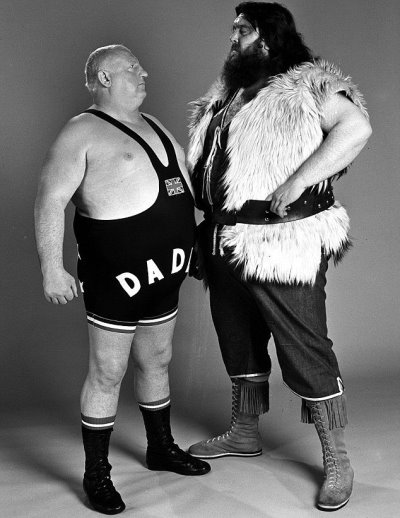Lost stories and hidden histories are being uncovered for new audiences by academics from De Montfort University Leicester (DMU) - including a dramatic look at the resurgence of the once monumental British Wrestling movement.

Big Daddy and Giant Haystacks size each other up
Four DMU researchers are showcasing their research as part of Being Human, Britain’s biggest celebration of the humanities which features more than 300 events across the UK on the theme of Lost and Found.
Dr Claire Warden, Professor Elizabeth Tingle, Professor Gabriel Egan and Dr Kathleen Bell will be delivering free talks for DMU students, staff and the general public during the festival on the week of November 17 to 25. The events are:
- The Lost History of Wrestling, Sunday 19 November, Attenborough Arts Centre 6pm to 8pm - 'Oh, you mean Big Daddy and Giant Haystacks'.
How can we account for the dramatic resurgence in British professional wrestling? How does it relate to the nostalgic history of wrestling in this country? And, most importantly, how can we understand this professional wrestling history as both performance art and sport?
Dr Claire Warden, DMU Reader in Drama, researches wrestling’s place in performance theatre. She co-edited Performance and Professional Wrestling (Routledge, 2016) which was the first book to take a scholarly look at the popular sport. The fun event, from 6pm to 8pm will allow audiences to see a training workshop, a discussion event, and two wrestling matches, with responses from artists, scholars and fans.
- Lost pilgrimage sites and statues, November 20, DMU’s Hugh Aston 0.10
In 1625, a farmer in Brittany found a lost statue of St Anne in a field on his farm, following a series of spectral lights over the site. It became the most important pilgrimage shrine in Brittany and one of a series of lost statues in early modern Europe.
Professor Elizabeth Tingle, Head of DMU’s School of the Humanities, will talk about what this tells us about the lives and beliefs of people in remote rural communities and its resonance for the revival of religious politics today.
- Lost and Found Shakespeare, November 22, DMU’s Hugh Aston 0.10
Professor Gabriel Egan, DMU’s Professor of Shakespeare Studies, made headlines around the world when his work helped show that Christopher Marlowe co-wrote plays previously credited to Shakespeare alone.
He has applied computational stylistics – sophisticated computer programmes which analyse writing patterns peculiar to individuals. This allows how this will benefits scholars of literature and theatre, as well as its impact on the Shakespeare canon.
- An Imaginative Journey through the James Watt Archives, November 23, Clephan Building, Room 0.01
James Watt was a towering figure during the Industrial Revolution. His invention of the condensing chamber enabled steam engines to be run cheaply, and from anywhere – transforming Britain from an agricultural nation to a country of manufacturers.
Kathleen Bell, principal lecturer in Creative Writing, has tried to discover the man behind the inventions, delving into the archives to create a sequence of poems. She will talk about the discoveries made in the archives and her work in progress, Jamie’s Book of Ingenuity.
Led by the School of Advanced Study, University of London, in partnership with the Arts and Humanities Research Council and the British Academy, Being Human 2017 is the only national humanities festival in the UK.
More than 300 events are taking place exploring themes including science and medicine, technology, politics and protest and the environment.
A spokesperson for the Being Human Festival said: “From shipwrecks and lost treasures to histories uncovered in archives, our programme demonstrates how humanities research is shaping the debates and shifting our understanding of the human world.”
Posted on Friday 17 November 2017